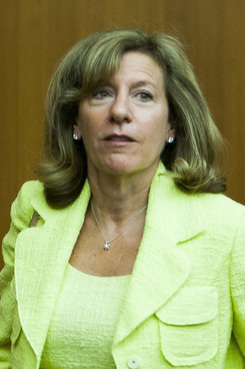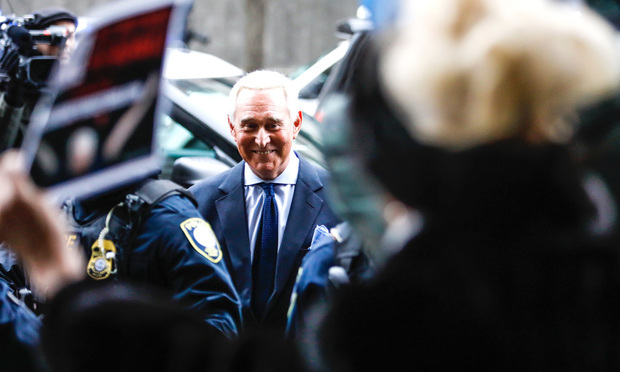Judge Amy Berman Jackson's Had a Front Row Seat for Mueller Cases
Judge Jackson's courtroom in Washington has been the central venue for various Mueller-related cases, giving the judge a unique outlet to express views on the Russia investigation—and the defendants.
December 17, 2019 at 05:33 PM
7 minute read
 U.S. District Judge Amy Berman Jackson.
U.S. District Judge Amy Berman Jackson.In the past three years, U.S. District Judge Amy Berman Jackson has been thrust to the fore as she played a central role in one of the most consequential probes in recent history, presiding over more prosecutions stemming from the Russia investigation than anyone else on the federal bench.
Indeed, Jackson has overseen a half-dozen cases rooted in the special counsel inquiry, forcing her to address the legitimacy of Robert Mueller's probe while navigating a turbid political environment.
On Tuesday, that role was on full display when Jackson sentenced Rick Gates, the former deputy chairman of the Trump campaign who pleaded guilty last year to financial fraud and lying to investigators. Gates emerged a key witness for Mueller's team, testifying in three trials stemming from the Russia investigation and assisting in the conviction of his longtime business partner Paul Manafort.
In sentencing Gates to three years of probation—with 45 days of "intermittent" prison time that could be largely spent over weekends—Jackson broadly endorsed the Russia investigation, just a week after the Justice Department's inspector general declared the FBI was justified in opening the probe. The inspector general, Michael Horowitz, is set to appear Wednesday on Capitol Hill to discuss his findings.
Jackson's courtroom in downtown Washington, on the second floor of the E. Barrett Prettyman U.S. Courthouse, served as the venue for Mueller-related prosecutions of Paul Manafort, the former Trump campaign chairman; the case against Roger Stone, the Trump ally and political consultant; and the trial of Gregory Craig, a former Obama White House counsel. Manafort was convicted, Stone's awaiting sentencing and Craig was acquitted.
The Gates prosecution provided Jackson her first major chance to discuss her view of what the government described as "extensive" cooperation with the Mueller investigation.
Jackson credited Gates with providing "firsthand information" about Manafort transferring confidential polling information to a business associate with ties to Russian and Ukrainian oligarchs. Jackson also noted information Gates provided about Stone, a longtime confidante of Trump's, and his claims of being in contact with Wikileaks ahead of the anti-secrecy group's release of hacked files that were damaging to Hillary Clinton's campaign.
"Gates' information alone warranted, indeed demanded, further investigation from the standpoint of our national security, the integrity of our elections and the enforcement of our criminal laws," Jackson said Tuesday.
Gates' debriefings with U.S. authorities, Jackson said, "are a reminder that there was an ample basis for decision-makers at the highest level at the United States Department of Justice—the United States Department of Justice of this administration—to authorize and pursue a law enforcement investigation into whether there was any coordination between the campaign and the known foreign interference in the election, as well as into whether there had been any attempt to obstruct that investigation and to leave no stone unturned."
Jackson said she struggled to balance Gates' cooperation—which prosecutors described as "extraordinary"—with the gravity of his crimes. Prosecutors said they did not oppose Gates' request for a probation-only sentence, but Jackson on Tuesday said she was mindful of defendants convicted of lesser offenses who have been ordered to prison.
"It's very difficult for me to shake my concern that some period of time, some period of incarceration, was necessary to reflect the seriousness of the offense and to impose some punishment, and to acknowledge the real concerns I have about parity in this case," Jackson said.
Pulling Jackson in the other direction was Gates' cooperation with the Russia investigation, which she described as "much more extensive than is ordinarily sufficient" to win the government's support for leniency. Jackson noted that Gates has testified in three cases and said "there may be more."
Jackson praised Gates' trial testimony, saying he "didn't appear to embroider the evidence in an effort to advance the government's case," avoiding the impression that he was a "bought-and-paid-for-puppet" for prosecutors.
In a span of a few months this year, Jackson, an Obama-era court pick and former white-collar defender, presided over a pair of trials in which Gates appeared as a key witness.
Gates took the stand in August to testify against Craig, a prominent Washington lawyer who was charged with misleading the Justice Department about his past work for Ukraine, in what prosecutors characterized as a scheme to avoid registering as a foreign agent.
 Former Trump adviser Roger Stone arrives for his arraignment at Federal Court in Washington on Tuesday, Jan. 29, 2019. (Photo: Diego M. Radzinschi / ALM)
Former Trump adviser Roger Stone arrives for his arraignment at Federal Court in Washington on Tuesday, Jan. 29, 2019. (Photo: Diego M. Radzinschi / ALM)Gates recently testified in the trial of Stone, who was convicted of lying to Congress and tampering with a witness. Jackson has yet to sentence Stone, who drew the judge's ire ahead of trial when he posted a photo showing what appeared to be crosshairs near the judge's face.
For several days, Jackson's face was splashed on national news shows, as she weighed whether and how to punish Stone for violating the gag order she'd earlier imposed.
Other Mueller-related cases also landed in Jackson's court. In April, Jackson sentenced Sam Patten, a Washington lobbyist and onetime Manafort associate, to three years of probation for failing to register as a foreign agent in connection with his consulting work for Ukraine. Last year, the judge sentenced a former Skadden associate, Alexander Van der Zwaan, to 30 days in prison for lying to the special counsel team about his past communications with Gates.
Recalling that sentence Tuesday, Jackson said Van der Zwaan's remorse for his actions as "considerably more grudging."
While she commended Gates for his cooperation, Jackson was harsh in her assessment of his past misconduct. Jackson said it was "hard to overstate" the lies and amount of money that was involved in Gates and Manafort's years of financial fraud, which included money laundering, dodging taxes and failing to disclose overseas bank accounts.
Turning to the accusation that Gates failed to register as a foreign agent, Jackson trumpeted the value of FARA, a decades-old law requiring the disclosure of political activities for foreign powers.
"This deliberate effort to obscure the facts, to mislead, undermines our policy making. If people don't have the facts, democracy doesn't work," Jackson said, echoing remarks she made in sentencing Manafort, who is serving a combined sentence of more than seven years on federal charges filed in Washington and Alexandria.
Noting that Manafort was the primary beneficiary of their fraud, Jackson credited Gates for taking responsibility for his misconduct rather than paint his former business partner as a kind of "charismatic Svengali" who coerced him to "cross the line." She bristled at one letter, written by an unspecified friend of family member of Gates', that suggested he was corrupted by Washington.
"One of the letter writes said that he got caught up in D.C. political drama, but I reject that. It's perfectly possible to conduct yourself with ethics, integrity and no hint of scandal, even in politics, even in D.C., even in Ukraine," Jackson said.
"Politics don't corrupt people. People corrupt politics."
Read more:
Judge Ketanji Brown Jackson Makes Her Mueller-Arena Debut With McGahn Case
Who Is Trevor McFadden? Meet the Judge Assigned the Trump Tax Returns Case
How WilmerHale's Carl Nichols Got Trump's Nod for DC Federal Trial Bench
'Turn That Plane Around' and Other Times Judge Emmet Sullivan Was Outraged
Amy Berman Jackson, Judge Assigned to Manafort Case, No Stranger to Spotlight
This content has been archived. It is available through our partners, LexisNexis® and Bloomberg Law.
To view this content, please continue to their sites.
Not a Lexis Subscriber?
Subscribe Now
Not a Bloomberg Law Subscriber?
Subscribe Now
NOT FOR REPRINT
© 2025 ALM Global, LLC, All Rights Reserved. Request academic re-use from www.copyright.com. All other uses, submit a request to [email protected]. For more information visit Asset & Logo Licensing.
You Might Like
View All
Wells Fargo and Bank of America Agree to Pay Combined $60 Million to Settle SEC Probe

Supreme Court May Limit Federal Prosecutions Over 'Misleading' but True Statements

CFPB Alleges Berkshire Hathaway Subsidiary Originated Unaffordable Housing Loans

Class Certification, Cash-Sweep Cases Among Securities Litigation Trends to Watch in 2025
6 minute readTrending Stories
Who Got The Work
J. Brugh Lower of Gibbons has entered an appearance for industrial equipment supplier Devco Corporation in a pending trademark infringement lawsuit. The suit, accusing the defendant of selling knock-off Graco products, was filed Dec. 18 in New Jersey District Court by Rivkin Radler on behalf of Graco Inc. and Graco Minnesota. The case, assigned to U.S. District Judge Zahid N. Quraishi, is 3:24-cv-11294, Graco Inc. et al v. Devco Corporation.
Who Got The Work
Rebecca Maller-Stein and Kent A. Yalowitz of Arnold & Porter Kaye Scholer have entered their appearances for Hanaco Venture Capital and its executives, Lior Prosor and David Frankel, in a pending securities lawsuit. The action, filed on Dec. 24 in New York Southern District Court by Zell, Aron & Co. on behalf of Goldeneye Advisors, accuses the defendants of negligently and fraudulently managing the plaintiff's $1 million investment. The case, assigned to U.S. District Judge Vernon S. Broderick, is 1:24-cv-09918, Goldeneye Advisors, LLC v. Hanaco Venture Capital, Ltd. et al.
Who Got The Work
Attorneys from A&O Shearman has stepped in as defense counsel for Toronto-Dominion Bank and other defendants in a pending securities class action. The suit, filed Dec. 11 in New York Southern District Court by Bleichmar Fonti & Auld, accuses the defendants of concealing the bank's 'pervasive' deficiencies in regards to its compliance with the Bank Secrecy Act and the quality of its anti-money laundering controls. The case, assigned to U.S. District Judge Arun Subramanian, is 1:24-cv-09445, Gonzalez v. The Toronto-Dominion Bank et al.
Who Got The Work
Crown Castle International, a Pennsylvania company providing shared communications infrastructure, has turned to Luke D. Wolf of Gordon Rees Scully Mansukhani to fend off a pending breach-of-contract lawsuit. The court action, filed Nov. 25 in Michigan Eastern District Court by Hooper Hathaway PC on behalf of The Town Residences LLC, accuses Crown Castle of failing to transfer approximately $30,000 in utility payments from T-Mobile in breach of a roof-top lease and assignment agreement. The case, assigned to U.S. District Judge Susan K. Declercq, is 2:24-cv-13131, The Town Residences LLC v. T-Mobile US, Inc. et al.
Who Got The Work
Wilfred P. Coronato and Daniel M. Schwartz of McCarter & English have stepped in as defense counsel to Electrolux Home Products Inc. in a pending product liability lawsuit. The court action, filed Nov. 26 in New York Eastern District Court by Poulos Lopiccolo PC and Nagel Rice LLP on behalf of David Stern, alleges that the defendant's refrigerators’ drawers and shelving repeatedly break and fall apart within months after purchase. The case, assigned to U.S. District Judge Joan M. Azrack, is 2:24-cv-08204, Stern v. Electrolux Home Products, Inc.
Featured Firms
Law Offices of Gary Martin Hays & Associates, P.C.
(470) 294-1674
Law Offices of Mark E. Salomone
(857) 444-6468
Smith & Hassler
(713) 739-1250










